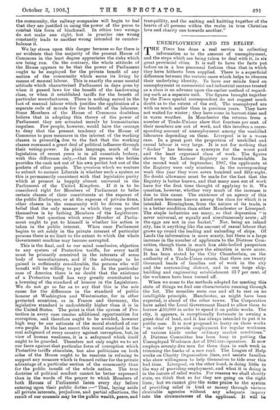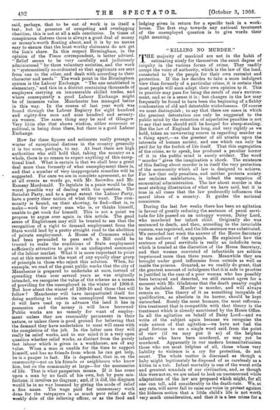UNEMPLOYMENT AND ITS RELIEF. T HE Times has done a real
service in collecting information as to the amount of unemployment, and the steps which are being taken to deal with it, in six great provincial cities. It is well to have the facts put before us in a less piecemeal fashion than that in which they have hitherto been supplied. There is a superficial difference between the various cases which helps to obscure their underlying identity. To have our minds fixed on unemployment in commercial and industrial centres treated as a class is an advance upon the earlier method of regard- ing each as a separate unit. The figures brought together by the Times special correspondent do not suggest muck doubt as to the extent of the evil. The unemployed are with us much earlier than in previous years. They have not waited for winter ; they have come in harvest-time and in warm weather. In Manchester the returns from a number of Trade-Unions show that fourteen per cent. of their members are out of work, and this involves a corre• spondiug amount of unemployment among the unskilled labourers depending on them. Liverpool is in a worse case. In a great port the proportion of unskilled and casual labour is very large. It is not for nothing that " docker " has become a synonym for the worst paid and the least organised class of work. The figures shown by the Labour Registry are formidable. In the second week of September, 1907, the applicants at the Registry were only nineteen. In the corresponding week this year they were seven hundred and fifty-eight. No doubt allowance must be made for the fact that the Registry is better known, and that many men out of work have for the first time thought of applying to it. We question, however, whether very much of the increase is due to this cause. The existence of an agency of this kind soon becomes known among the class for which it is intended. Birmingham, from the nature of its trade, is in a better condition than either Manchester or Liverpool. The staple industries are many, so that depression " is never universal, or equally and simultaneously acute ; all the eggs are not in one basket." Nor, being an inland city, has it anything like the amount of casual labour that grows up round the loading and unloading of ships. Of Leeds the information is more scanty, but there is a large increase in the number of applicants to the Distress Com- mittee, though there is much less able-bodied pauperism than in 1904. In Glasgow the situation is more acute. It has been stated by the City Chamberlain, on the authority of a Trade-Union return, that there are twenty thousand heads of families out of work in the city and the surrounding district, and in one large ship- building and engineering establishment 31'7 per cent. of the workmen have been turned off.
When we come to the methods adopted for meeting this state of things we find one characteristic running through the list. The remedies seem one and all to rest on no intelligible principle. Manchester, as might have been expected, is ahead of the other towns. The Corporation have asked the. Local Government Board to allow them to borrow £50,000 in order to spend it on public works. The city, it appears, is exceptionally fortunate in owning a great deal of land, and it has always intended to put it to public uses. It is now proposed to hurry on these works " in order to provide employment for regular workmen of various kinds under ordinary market conditions." A Distress Committee has been busy in putting the Unemployed Workmen Act of 1905 into operation. It now employs seventy-five men for three days in each week in. trimming the banks of a new road. The League of Help works on Charity Organisation lines, and assists families who show willingness to help themselves to tide over this bad time. Liverpool, on the other hand, is doing little in the way of providing employment, and what it is doing is in the nature of relief works. For reasons we shall shortly state, we think that so far they are going on the right lines; but we cannot give the same praise to the system of providing relief in kind or .money through various charitable agencies without any adequate inquiry into the circumstances of the applicant, It will be said; perhaps, that to be out of work is in itself a teat ; but in presence of competing and overlapping charities, this is not at all a safe conclusion. In times of conspicuous distress there is always a good deal of money or money's-worth floating about, and it is by no means easy to ensure that the least worthy claimants do not get the lion's share. In this respect Birmingham, in the opinion of the Times correspondent, is better advised. " Relief seems to be very carefully and judiciously administered " by three voluntary societies, and the work is "systematically co-ordinated so that applicants are sent from one to the other, and dealt with according to their character and needs." The weak point in the Birmingham system is the Labour Exchange. " The one established is elementary," and this in a district containing thousands of employers carrying on innumerable skilled trades, and where consequently a good Labour Exchange might be of immense value. Manchester has managed better in this way. In the course of last year work was found through the Labour Registry for eight hundred and eighty-five men and nine hundred and seventy- six women. The same thing may be said of Glasgow. Very little else that shows wisdom, either economic or political, is being done there, but there is a good Labour Exchange.
How far these figures and estimates really presage a winter of exceptional distress in the country generally it is too soon, perhaps, to say. At least there are high authorities who still hold that, taking the country as a whole, there is no reason to expect anything of this excep- tional kind. What is certain is that we stilll hear a great deal more than formerly of what unemployment there is, and that a number of very inappropriate remedies will be suggested. For once we are in complete agreement, so far at 'all events as words go, with Mr. Snowden and Mr. Ramsay Macdonald. To legislate in a panic would be the worst possible way of dealing with the question. The Socialist Party, and to a great extent the Labour Party, haVe a pretty clear notion of what they want. The com- munity is bound, on their showing, to find—that is, to make—work for every man who is, or thinks himself, unable to get work for himself. This is not a point we propose to argue over again in this article. The good sense of Englishmen may still be trusted to see that the recognition of a right to demand employment from the State would lead by a pretty straight road to the abolition of private employment. A House of Commons which had been persuaded to pass such a Bill could be trusted to make the conditions of State employment sufficiently attractive to give it an undisputed command of the labour market. What it is more important to point out at this moment is the want of any equally clear grasp of principle in those who reject this solution. When, for example, we read of the great public works that the city of Manchester is prepared to undertake at once, instead of spreading them over several years as was originally intended, we recognise the value of the scheme as a means of providing for the unemployed in the winter of 1908-9. But how about the winter of 1909-10 and those that will follow ? Manchester will have incapacitated itself for doing anything to relieve its unemployed then because it will have used up in advance the - land it has in possession and the money it will have borrowed. Public works are no remedy for want of employ- ment' unless they are reasonably permanent in their nature, or unless there is good ground for believing that the demand they have undertaken to meet will cease with the completion of the job. In the latter case they will really be relief works, and to our mind it is a very open question whether relief works, as distinct from the purely test labour which is given in a workhouse, are of any value. When a man is unable for the time to support himself, and has no friends from whom he can get help, be is a pauper in fact. He is dependent, that is, on the community—not on his friends or neighbours who know him, but on the community at large—for the necessaries of life.. That is what pauperism means. If it has come upon a man by no fault of his own, but by pure mis- fortune; it involves no disgrace ; and, if it did, the disgrace would be in no way lessened by giving the mode of relief a - fine. name. The wage paid for unnecessary work dime for the ratepayers is as much poor relief as the weekly: dole of the relieving officer, or as the food and lodging given in return for a specific task in a work- house. The first step towards any national treatment of the unemployed question is to give words their right meaning.

























































 Previous page
Previous page